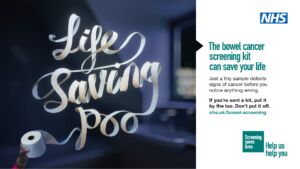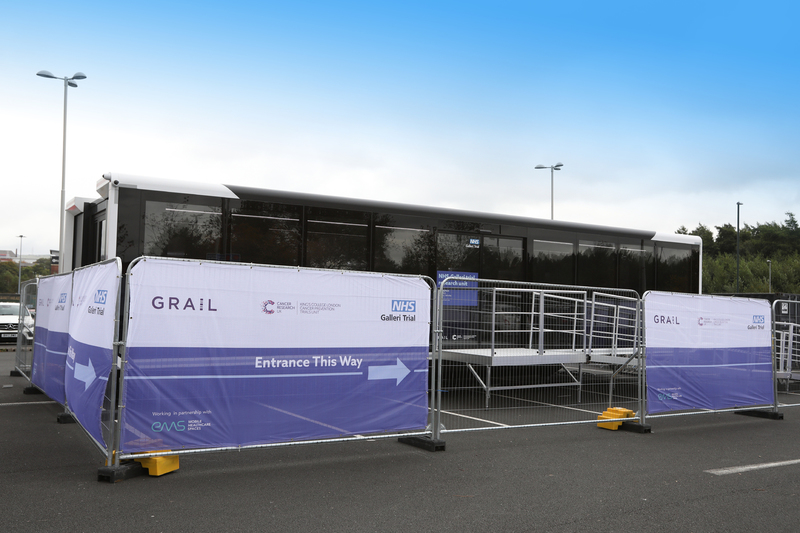NHS Director of Vaccinations and Screening Steve Russell said: “Screening is one of the best ways to diagnose bowel cancer early, or in some cases prevent it from developing in the first place, so we want more people to do it; and stop this disease in its tracks.
“The FIT kit offers eligible people a chance to quickly and safely complete a test for bowel cancer at home; and ensure that more cases are detected earlier.
“If you’re sent the kit, help yourself by remembering to complete it. Put it by the loo. Don’t put it off.
“If you haven’t taken a test, but are experiencing bowel cancer symptoms, such as blood in your poo or severe stomach pain, no matter your age, you should speak to your GP as soon as possible.”
Bowel cancer is the fourth most common cancer in the UK, and the second biggest cancer killer.
Data shows that nearly 43,000 people are diagnosed with bowel cancer every year in the UK; and more than 16,500 people die from it- more than 45 people per day. The chances of surviving bowel cancer are much higher when it’s found at an early stage.
Cancer was caught early for Simon Clarke, 67, from Hornsey, north London, thanks to bowel cancer screening. Simon was investigated after his bowel cancer screening test; and polyps – little growths – were removed from his bowel.
Simon, said: “I wasn’t particularly worried.
“But when they analysed the polyps, cancer was in one of them. They caught it as a very minor tumour and it hadn’t spread. Without the screening I wouldn’t have known it was there.
“I’d say to other people: use the bowel cancer screening kit when you’re sent it, because if it catches something early like it did with me, it could save your life.”
Cancer Research UK have lent their support to the new campaign and feature on the new TV Ad.
Dr Julie Sharp, head of information at the charity, said: “We hope this campaign helps highlight the importance of the bowel cancer screening programme and how easy the kit is to do. The test, for people without symptoms, now only requires one tiny sample of poo, and can spot hidden traces of blood that could be a sign of cancer. Finding cancer at an early stage makes it much more treatable and we recommend people complete the kit.”
Due to increased uptake of the FIT kit, more cancers are now being detected by the NHS than when the previous test was used. The FIT kit also generates fewer false positives and finds more polyps -which can be removed at colonoscopy, that might otherwise develop into cancers.
National Clinical Director for Cancer, Professor Peter Johnson, said: “Thousands of people in England develop bowel cancer each year, but the chances of surviving it are very good when it is caught early, which is why the NHS is sending out millions of free bowel cancer screening kits for people to use in private, at home, which could potentially save their life.
“We have seen a fantastic response to our previous cancer awareness campaigns, with record levels of people coming forward for cancer checks, and more people starting cancer treatment than in previous years.
“I would urge everyone who is sent a kit to return their test as quickly as they can, because this can detect the early signs of bowel cancer and ensure that anyone affected can get treatment for the disease as soon as possible. Don’t die of embarrassment.”
Bowel cancer is also called colorectal cancer; and affects the large bowel, which is made up of the colon and rectum. Most bowel cancers develop from pre-cancerous growths, called polyps.
Genevieve Edwards, Chief Executive at Bowel Cancer UK, says: “Taking part in bowel cancer screening can often find the cancer before symptoms develop, when it’s much easier to treat. Quite simply, bowel cancer screening could save your life and we would encourage everyone to complete the test when they receive it.”
Cancer cells may stay in the bowel or they might spread to other parts of the body, like the liver or lungs.
Health and Social Care Secretary Steve Barclay said: “Bowel cancer is the fourth most common cancer in the UK, but we know that screening increases the chances of early diagnosis which can prevent deaths from this devastating disease.
“With the launch of the NHS’ first national campaign on bowel cancer screening, more people will be encouraged to use the home testing kit when they receive it. Screening makes it more likely that bowel cancer will be successfully detected and treated.
‘’Together with the NHS we are continuing to extend the screening offer to those aged 50-74. I urge everyone who receives a kit to use it.’’





